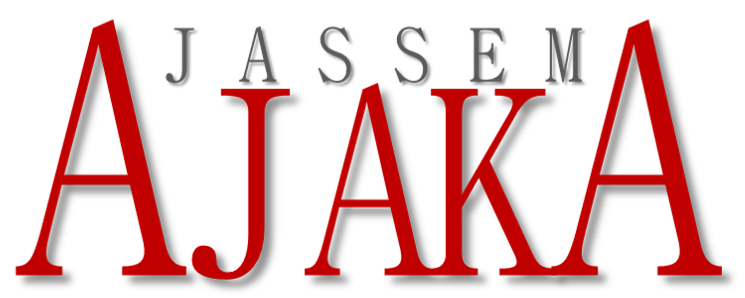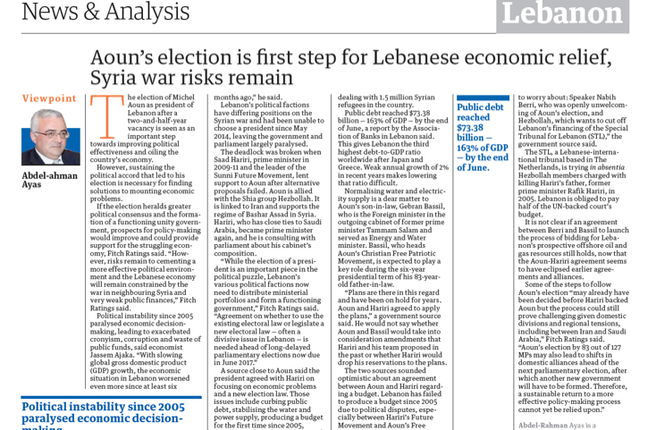jassemajaka@gmail.com
Aoun’s election is first step for Lebanese economic relief, Syria war risks remain
Abdel-Rahman Ayas
The election of Michel Aoun as president of Lebanon after a two-and-half-year vacancy is seen as an important step towards improving political effectiveness and oiling the country’s economy. However, sustaining the political accord that led to his election is necessary for finding solutions to mounting economic problems. If the election heralds greater political consensus and the formation of a functioning unity government, prospects for policy-making would improve and could provide support for the struggling economy, Fitch Ratings said. “However, risks remain to cementing a more effective political environment and the Lebanese economy will remain constrained by the war in neighbouring Syria and very weak public finances,” Fitch Ratings said. Political instability since 2005 paralysed economic decision-making, leading to exacerbated cronyism, corruption and waste of public funds, said economist Jassem Ajaka. “With slowing global gross domestic product (GDP) growth, the economic situation in Lebanon worsened even more since at least six months ago,” he said. Lebanon’s political factions have differing positions on the Syrian war and had been unable to choose a president since May 2014, leaving the government and parliament largely paralysed. The deadlock was broken when Saad Hariri, prime minister in 2009-11 and the leader of the Sunni Future Movement, lent support to Aoun after alternative proposals failed. Aoun is allied with the Shia group Hezbollah. It is linked to Iran and supports the regime of Bashar Assad in Syria. Hariri, who has close ties to Saudi Arabia, became prime minister again, and he is consulting with parliament about his cabinet’s composition. “While the election of a president is an important piece in the political puzzle, Lebanon’s various political factions now need to distribute ministerial portfolios and form a functioning government,” Fitch Ratings said. “Agreement on whether to use the existing electoral law or legislate a new electoral law — often a divisive issue in Lebanon — is needed ahead of long-delayed parliamentary elections now due in June 2017.” A source close to Aoun said the president agreed with Hariri on focusing on economic problems and a new election law. Those issues include curbing public debt, stabilising the water and power supply, producing a budget for the first time since 2005, developing the infrastructure and dealing with 1.5 million Syrian refugees in the country. Public debt reached $73.38 billion — 163% of GDP — by the end of June, a report by the Association of Banks in Lebanon said. This gives Lebanon the third highest debt-to-GDP ratio worldwide after Japan and Greece. Weak annual growth of 2% in recent years makes lowering that ratio difficult. Normalising water and electricity supply is a dear matter to Aoun’s son-in-law, Gebran Bassil, who is the Foreign minister in the outgoing cabinet of former prime minister Tammam Salam and served as Energy and Water minister. Bassil, who heads Aoun’s Christian Free Patriotic Movement, is expected to play a key role during the six-year presidential term of his 83-year-old father-in-law. “Plans are there in this regard and have been on hold for years. Aoun and Hariri agreed to apply the plans,” a government source said. He would not say whether Aoun and Bassil would take into consideration amendments that Hariri and his team proposed in the past or whether Hariri would drop his reservations to the plans. The two sources sounded optimistic about an agreement between Aoun and Hariri regarding a budget. Lebanon has failed to produce a budget since 2005 due to political disputes, especially between Hariri’s Future Movement and Aoun’s Free Patriotic Movement. “Two things to worry about: Speaker Nabih Berri, who was openly unwelcoming of Aoun’s election, and Hezbollah, which wants to cut off Lebanon’s financing of the Special Tribunal for Lebanon (STL),” the government source said. The STL, a Lebanese-international tribunal based in The Netherlands, is trying in absentia Hezbollah members charged with killing Hariri’s father, former prime minister Rafik Hariri, in 2005. Lebanon is obliged to pay half of the UN-backed court’s budget. It is not clear if an agreement between Berri and Bassil to launch the process of bidding for Lebanon’s prospective offshore oil and gas resources still holds, now that the Aoun-Hariri agreement seems to have eclipsed earlier agreements and alliances.Some of the steps to follow Aoun’s election “may already have been decided before Hariri backed Aoun but the process could still prove challenging given domestic divisions and regional tensions, including between Iran and Saudi Arabia,” Fitch Ratings said. “Aoun’s election by 83 out of 127 MPs may also lead to shifts in domestic alliances ahead of the next parliamentary election, after which another new government will have to be formed. Therefore, a sustainable return to a more effective policy-making process cannot yet be relied upon.”


